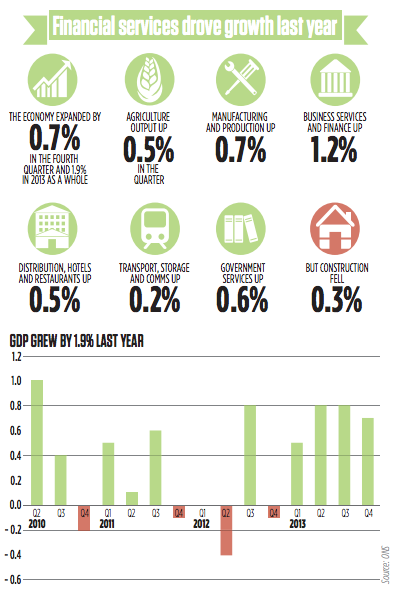Best year for UK economy since 2007 now official
STRONG ACTIVITY across the UK’s business and finance services drove the economy to growth of 0.7 per cent in the final quarter of last year, making 2013 both the strongest and first uninterrupted year of growth since 2007, before the financial crisis.
Official figures released yesterday morning point to a broad recovery across the economy, with services expanding by 0.8 per cent and manufacturing by 0.9 per cent from the third quarter.
But business services and finance did particularly well between October and December, with a 1.2 per cent expansion.

Though construction fell by 0.3 per cent, this followed a rapid 2.7 per cent boost in the three months to September. The sector grew by 4.6 per cent in 2013 as a whole, outstripping the rest of the economy.
Berenberg’s Robert Wood gave a bullish view of the prospects for the UK: “The headwinds should ease this year as productivity begins rising, wages finally starting increasing in real terms, businesses pull the trigger on investment and the Eurozone gradually recovers.”
GDP grew by 1.9 per cent during 2013, the fastest since the year before the financial crisis.
Despite growing in every other quarter of the year, mining and quarrying was one of the only sectors to see a contraction in the last three months of the year, slipping by 1.5 per cent.
The economy is still 1.3 per cent below its previous peak, but will likely return to that level in the second or third quarter of this year if growth sticks to this pace.
According to Investec’s forecasters, the UK is likely to grow by around 2.7 and 2.8 per cent respectively this year and next, adding that there is now a reasonable chance that it will exceed three per cent in either or both.
However, Standard and Poor’s defended their decision to keep the UK on a negative outlook today. The credit ratings agency remain sceptical of “the sustainability of the UK’s recent economic dynamism”, noting that growth so far has stemmed from consumption and the declining savings rate of British workers, rather than wage increases, investment or improved export performance.